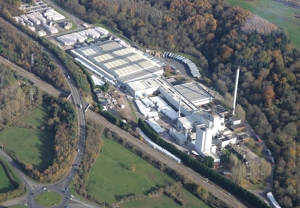Bridging the energy gap

Difficult times call for pragmatic measures, prompting Mark Northcott of Remeha Commercial to explore how boilers can help improve the energy efficiency of the nation and support the move towards a sustainable future.
If we are to take today’s headlines at face value, we’re heading for an energy gap. Not only is the price of energy continuing to spiral, increasing utility bills and straining already tight budgets, but if the dire forebodings are to be believed, the lights are destined to turn off in the not too distant future across the UK as we exceed our energy supply.
In more restrained but no less hard-hitting terms, Ofgem, the energy regulator, warns that our energy industry is struggling to secure enough supplies to homes and businesses. The blame can be laid at a number of doors — our increasing dependency on importing gas from abroad, the closure of aging inefficient power stations, the global financial crisis, steep environmental targets and our current insatiable demand for energy.
Energy is crucial to our economy and our everyday lives. Our long-term goal is clear, to generate our energy from renewable sources. It’s the short-term strategy that’s proving the problem. We are targeted with 15% of our energy coming from renewable sources by 2020, based on 1990 levels. Yet the UK was recently named and shamed by the European Renewable Energy Council (EREC) in its latest ‘Keep on track’ report; as the only member state to fail to achieve our interim 2011/2012 target based on 2011 data, we are identified as unlikely to meet our 2020 renewables supply target.
Renewable-energy technologies still require considerable financial investment (raising the question, perhaps, whether they are therefore financially ‘sustainable’). The uptake is supported in many of our neighbouring European countries by sustained Government funding. In the UK, however, the Government’s energy policy has lacked clarity and continuity. The Renewable Heat Incentive is a case in point; the Department of Energy and Climate Change suffered an 8% reduction in its budget in the last spending review, which resulted in less funding for the non-domestic sector and a further delay to the introduction of the RHI for the domestic sector.
If renewables are not an energy panacea at present, an alternative approach needs to be identified. Businesses, organisations and industries, concerned over national energy security and with tough profitability and environmental targets to meet within reduced budgets, are addressing the efficiency of their operation to make savings wherever possible. With heating and hot water accounting for nearly half of the UK’s energy use and around 40% of greenhouse-gas emissions, it makes sense to look for ways of improving the energy efficiency of heating in buildings.
The Government is preparing for our future with a balanced energy mix. However, gas is still our main fuel for heating, and, with or without shale gas, will remain so for the next 40 to 50 years.

Condensing boiler technology may not seem as exciting an option as renewables, yet today’s advanced, refined models provide affordable, flexible, ‘green’ heating solutions for new-build and refurbishment projects. Furthermore, at present, most renewable technologies such as heat pumps or solar thermal heating systems still require support from a gas condensing boiler in periods of high demand, making them an essential component for the reliable delivery of heat.
Of course, using renewable technology for sustainable heating is not always an option, especially in old commercial buildings, due to the existing heating system or the nature of the building itself. Yet improving the energy efficiency of the UK’s high percentage of old buildings would go a long way to helping meet our carbon-reduction target of 80% by 2050. Replacing an old atmospheric boiler with a modern condensing model and the appropriate smart control could halve fuel consumption, and cut CO2 and NOx emissions by as much as 90%. Downtime or disruption is minimal due to easier installation whilst the compact size often brings an unexpected bonus in the shape of valuable extra office space.
‘Super-condensing’ heat-recovery systems provide the perfect example of how sophisticated condensing technology has become, guaranteeing the energy-efficiency benefits of condensing operation, even with flow/return temperatures of 82/71°C, to achieve a nett efficiency of 107%. The otherwise wasted energy can be used for space heating or pre-heating domestic hot water. An affordable, greener heating alternative for new build, it is also the perfect solution for a retrofit project, recovering energy from an old heating system that takes more energy to heat.
Whether the sole heating component, operating in cascade, or part of a bivalent heating system, high-efficiency condensing and ‘super-condensing’ boilers are playing a vital role in the UK’s move to a more energy-aware and energy-efficient nation. Versatile, fully modulating and clean burning, they are an affordable, replicable solution to energy-saving warmth. Furthermore, condensing and ‘super-condensing’ boilers provide an appealing financial incentive: while the cost to upgrade to energy-efficient boilers remains fixed, the savings they deliver will increase as fuel costs continue to soar — a bright light on the energy horizon that will help bridge the energy gap and keep our own lights on.
Mark Northcott is managing director of Remeha Commercial









